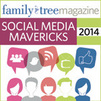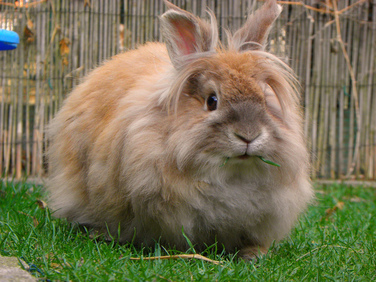 First there was one. A fluffy one. First there was one. A fluffy one. To Re-cap This Whole Organizational Stuff: We've already talked about [O.K. I've talked about] what to do with all the stuff you find out about your family's history and how to organize it ~ both IRL [In Real Life] and in your fantasy world [Oops. I meant on the computer.] What's next? How to be organized while you're looking for the information that you so desperately want about your family. I mean, it won't be any fun gossiping about Great-Aunt Bernice and her poor choices if when you go to look through that incredibly long list of bookmarks, you can't find the link for the website that had that incredible story [With sources. Hey, if you're gonna dream, dream big.] about how Great-Aunt Bernice took off one day with a..." [I thought I'd let you fill in the blank.] You might think, "Caroline, I would never do that. I mean, I only have maybe 10 - okay 15 - bookmarks. I could never have so many that I wouldn't be able to find that awesome story about my Great-Aunt Bernice." 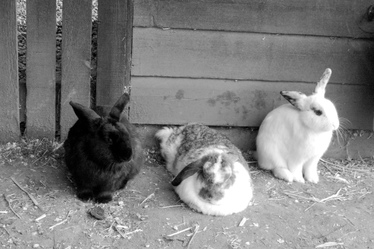 Then there were three. Then there were three. [Big sigh.] Yeah. That's what I thought, too. Pre-G [Pre-Genealogy]. But it will happen. Remember how I said these ancestors will multiply like rabbits? Well, each one comes with at least 2 stories. They were born. Then they died. [Hey, I didn't say they were all going to be exciting.] And think for a moment about how many people live in your house. I'm not very good at math, but if every living person has at least 1 story and you multiply that by how many people live in your house with you, that could mean you have at least 1 story if you live alone [Not counting your cats.], or if you have adult children that have permanently camped out in your basement because they are on the "hey-they-don't-have-to-pay-rent-you-cook-their-meals-iron-their-clothes-basically-do-everything-for-them" program [And where can I sign up for that?], then you're going to have a whole lot more stories. [See how I cleverly sidestepped that whole math business?] Anywho. There's a TON of stuff online that can make your online search so much easier while looking for your rabbits' stories. [Oops. I mean ancestors' stories.] So, I've created a Resources List to help you with your research. Some are paid subscription services, but many more are absolutely FREE. 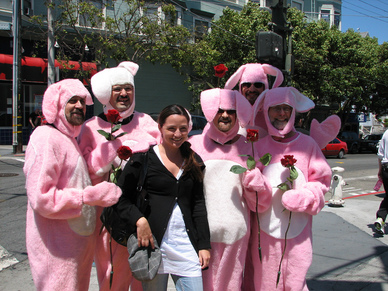 Then there were grown men dressed as rabbits? Then there were grown men dressed as rabbits? And? That's the end of the Getting Started Series, but it's the beginning of your research both online and offline. Or perhaps it's the continuation because maybe you'd already started. Either way, it's time for research. ~Caroline
0 Comments
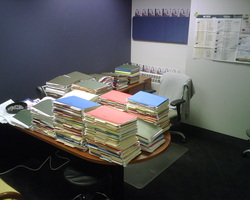 That's a LOT of filing to do. Break time! That's a LOT of filing to do. Break time! Well, we're going to try to get ourselves ready for our genealogy before we even find it. A bit ambitious? Yes. But very do-able. Have you set-up your IRL [in real life] folders? Remember, any way you set them up is fine as long as it works for you. And by "works" I mean you stay organized and you're using it. It doesn't work if you don't use it. [Like a lot of things in life.] The next step is to get our digital files set-up. We're going to basically use the same division in paperwork and/or documents as we did in our IRL files. There are 2 additions that I would suggest: (1) to separate the birth and death records, and (2) to add one for photos. Why didn't we include "photos" in our IRL folders? Because [if you're lucky], that can become voluminous in our surname notebooks and/or file folders. Plus, we're going to want to learn how best to archive our photos. Keeping them with your research is not the best way to archive them. Digitally, we don't have these problems. So go ahead and include them here. The basic organization of these files should look something like this: My Documents Surname [e.g., SMITH]
My Documents SMITH Research Plans Martha Jane William Andrew Thomas I Thomas II Reference Materials Maps Family Charts/Reports Correspondence Locale History Land Records Marriage Records Martha Jane William Andrew Thomas I Thomas II Tax Records Probate Records Cemetery Records Church Records Military Records Birth Records Death Records Immigration & Naturalization Photos The alternative way to organize this would be to organize the given names under the surnames, then divide into the paperwork/documents. It's really up to you on how you want to do this. I, personally, like my computer files to mirror my IRL files as much as possible, so I organize by given names last. Really, one could go on and on and on with this whole organization stuff and never really get to the researching, which is, if you remember, what we are here for. [I kid you not.] Just know that whatever system you come up with is good if it allows you to keep the results of your research in a such a way that you can retrieve it when you need it. These last 2 posts covered how to organize information that we have already found while researching. The next posts will have suggestions on how to be organized while looking for the information. Then maybe, just maybe, we'll get to that researching. I'm just kidding. We'll get to the researching. Online. And offline. In the mean time, get your folders created ~the IRL [in real life] ones & the digital ones. Then you can start filing any paperwork/documents that you may have and/or if you've already started researching, then start filing those results. Any questions? ~Caroline 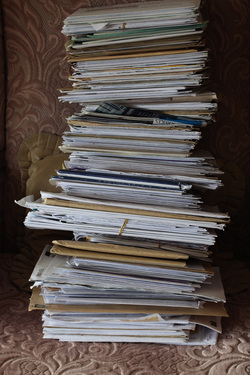 Are you ready to get organized? Even if you are never organized in anything else you do, you must try to be organized in doing genealogy research. As mentioned in the previous posts, there are 2 major divisions of organization:
Anywho, I actually use a hybrid of the two systems. How's that for being diplomatic? I told you I didn't like someone forcing something on me just because they thought their way was superior. I showed them. I created a hybrid system. [Stubborness can breed ingenuity.] Basically, both systems are the same. First, I'll explain how they are the same. And then I'll explain how I've adapted them for my use.  Overall, you'll want to organize all your paperwork by surname. So for example, if you are researching the names Smith, Davis, Johnson, and Vaughn, then you'll divide your paperwork first by these names. Then, within each surname, you'll want to divide your paperwork between the types of paperwork. For example, Birth, Death, Marriage, Land, etc. Some researchers would suggest that you don't need this particular level of organization yet, and to keep everything together in the surname division. My suggestion is to be ready for the paperwork so you don't have to stop later and divide it up. We already know that we'll be looking for and hopefully finding this paperwork. And it's best to be prepared. Now if you plan to use a hanging file cabinet or a plastic file box with hanging file folders, then this would be my suggestion on how to organize it. Use the hanging file folders and the tabs that came with them to make your surname division. Using the names above, you'd have a hanging folder for Smith, one for Davis, one for Johnson, and one for Vaughn. You most certainly will need more hanging folders that aren't marked in between the ones that are marked with a surname so that as you gather information and paperwork, you'll be able to expand each surname. Now, everyone divides and files the types of documents and paperwork differently. Again do what's best for you. I have come up with the following 16 divisions:
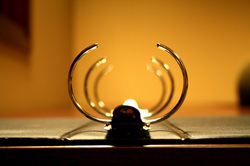 The notebook method is similar, but instead of using a cabinet, you use shelves [or the floor, or any flat service...]. And instead of using a hanging file folder for each surname, you use a notebook for each surname, labeling it on the spine with the surname. Then you use dividers with tabs for each of the types of records listed above. Later, additional notebooks will be needed for each surname. There are 16 different dividers that need to be labeled, so 2 packs of the 8-tab dividers is needed for each notebook. I use the notebook method for the most part, but because of the amount of paperwork that I deal with and my hate of filing [Oops. I mean lack of time for filing.], I've since added a plastic filing crate with surnames, and that helps me to keep things straight until I break down and file [Oops. I mean until I have time to file.]. Why 16 divisions? Simple. I'm cheap. Dividers with tabs come with 5-tabs or 8-tabs. I originally had 18 divisions, but didn't like having to buy 3 8-tab dividers, so I combined some. It stills serves me well, though. So. It's up to you on how you want to do it. And while you can certainly start searching for your ancestors before being ready to handle the paperwork you find, it's not advised. Just pick a way and do it. It's much easier on you in the long run if you are prepared for your ancestors. And all their secrets. And, of course, their stories. Any ideas on how you're filing your research paperwork or how you plan to do it? Any questions? Let me know in comments below. ~Caroline 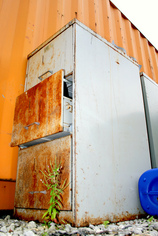 Before the internet became such an integral part of genealogy and family history research, all research had to be done offline back before there was even a distinction between offline and online. [Shocker, I know.] People actually had to get dressed and go down to places like the libraries, the archives, and the courthouses. [That's right. No surfing the internet in your jammies and your pink bunny slippers.] Now? Well, the the computer and internet have enhanced our ability to find information both online and offline. But don't get suckered into believing that all your research can be done online. It can't. Let me repeat that. Not all your research can be done online. If you try researching this way, you are going to run into brick walls very quickly, get frustrated, and probably quit looking. Or settle for information that was found online, but not credible. Online and offline research work together to provide the most complete research experience. Together "online and offline" are like... The yin and the yang. Salt and Pepper. Sugar and spice. Sonny and Cher. The Captain and Tennille. Cookies and Milk. Chocolate and peanut butter. Jammies and pink bunny slippers. 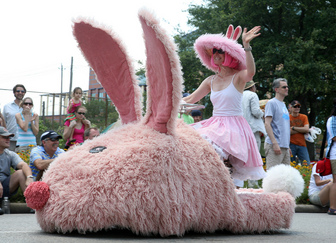 A Pink Bunny Slipper Festival? Really? A Pink Bunny Slipper Festival? Really? They belong together. Until, of course, every single document has been scanned and every family artifact has been photographed and every old photo has been scanned. Which the chances of that happening are, um slim to none. [And Slim just left the room.] So, it would be more accurate to say that, today, genealogy and family history research is a hybrid type of research that involves combining offline and online resources. And this hybrid approach has vastly influenced the way we organize our information, and can also be called hybrid as well ~ involving the computer and paper. And all the information that you are looking for can be categorized in 2 ways:
So that's what we'll be going over next. First, we'll go over how to organize your search online and your computer. Riveting. I know. But once we get it set-up, then it's just a matter of putting the paper and the file into the right folder. The real folder and the digital folder. And hey, don't forget. While going to the library in your jammies and pink bunny slippers is out of the question [No. Really. It is.], you can always read my blog in them. [Really. I don't mind.] ~Caroline 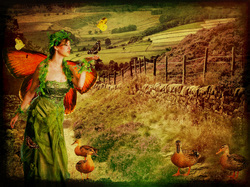 Have you ever gone to the grocery store without a list of the items you need? I do it all the time. Unfortunately. I don't know why I do this. It's unorganized and inefficient. As I proceed through the store, I always forget something. Then I have to backtrack to get the thing I wouldn't have forgotten to get if I had just made a list of the things I needed to get in the first place. It's aggravating to say the least. [Unless, of course, I bring my kids with me, in which case I just send them all over the store to get the things I forgot. But then I have to put up with their bickering.] Anywho. What does this have to do with genealogy? Well, researching without a plan and some organization can be a lot like my grocery shopping failures [Oops. I mean adventures.] A mess. [Especially since I've not recruited my kids to help me with genealogy research. Again. The bickering.] Furthermore, are you one of those totally organized, anal people whose food pantry shelves look like the grocery store shelves? [Yeah. Me neither.] The one time I did alphabetize all my spices [I like my food spicy.], someone saw it, and looked at me like I had sprouted another head. And then asked, "Did you alphabetize your spices?" Which, if you kind of think about it, was a silly question because obviously I had. And as I frantically rearranged my "ABC" spices, I replied, "No. I don't know how they got that way. Huh. Must've been a freaky coincidence. Or the Spice Fairy must have visited. Yeah, in the middle of the night. Um. Or something." And that was the end of that. [Of course, they probably thought I was crazy. Spice Fairy?] And now you're wondering what the spice-genealogy connection is, right? While researching [whether online or offline], you need to be able to put your hands on what you need at the precise time you need it. Trust me on this. It happens all the time. There is nothing more frustrating than needing that one death index, that one birth certificate, or that one piece of correspondence to be able to verify that you have the correct person, and not being able to find it. Very. Frustrating. So, what's it going to take to get organized? Not much. You're just starting out. And it need not be a complicated-pull-out-your-hair-oh-great-now-I'm-bald experience. There will be some decisions to make on which system is best for you. Then, I'll give you my 2 cents worth. [And if you're like my kids, you'll ignore me. And do it your way. *wink*] As you continue with your research, you'll probably want to change or modify your system. Why? Because the research that you are doing is a living, breathing thing. That will grow. That will expand. Until one day, as you're looking through your research, you realize, "Wow. This is my family story." So, over the next few posts we'll go through your options, step-by-step. I'm curious, though [which has served me well in researching]. Based on the research you've done so far [if any], how are you organizing your research? Are you happy with it? If you haven't started, how do you think you'll need to organize yourself? Please feel free to share your thoughts in the comments below. [Wow. Now I'm hungry. Let's see. Where did I put those spicy snacks?] ~Caroline  So now you have a date set for a visit with your family member. [Check.] You know now that you'll be visiting and sharing with your relative and not interviewing. [Just nod your head.] So what do you ask to get your family member talking? Well, there are really no special magic questions that will help them to open up, but some questions are better than others. As mentioned in the previous post, try not to ask yes or no questions. If you have to, make sure you follow them up with additional questions on the topic. The most important thing to remember is to be comfortable and conversational. Because that's what you are doing. Conversing. Don't worry, though. Most people like to talk about themselves. [Just ask us.] Speaking of asking, the following are some questions to help you along your merry way down memory lane with your family member. It's not exhaustive, but it should give you enough examples to get you started.
Oh, this post is available as a PDF document for you to download to your computer where you can then [if you want] print it out. [You're welcome.] Click here: Family History Questions Once it downloads, right-click with your mouse and select "Save As..." or "Print". [Next post: Gettin' Organized. Are you ready? That's good. At least one of us is. *wink*] ~Caroline 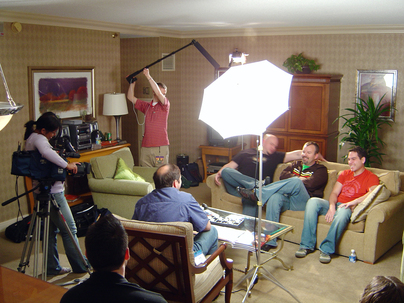 "Ignore the camera & lights. It's just you & me." "Ignore the camera & lights. It's just you & me." You: O.K. Now I have my list of people in my family to talk to about my family's history. Now what? Me: Well, how about some suggestions on how to do it? The actual questions we can work on in the next post. You: Oh. Well, I thought I'd go to my grandma's house on Saturday as a surprise and ask her to tell me all that she knows about our family. Me: Yeah. Um. Don't do that. In fact, you should do the exact opposite. [And before you ask me, no, I'm not kidding.] You see, it's really not "Genealogy and Interviewing". It's more like, "Genealogy and Visiting". And it's probably best if you plan your visit. Following are some suggestions for planning it:
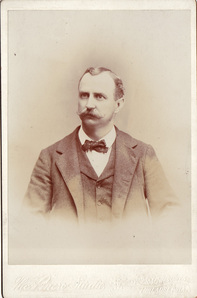
You: What about the questions? What do I ask? Me: See, you should've been taking notes. I mentioned it already, but here it is again. [Wink.] The next post will have suggestions about what you should ask. Any other questions? ~Caroline 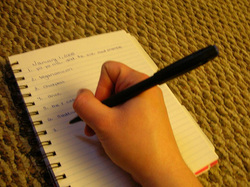 So, how's that pedigree chart coming along? Got some stuff filled-in? Have some blanks? Good. Now you have something to work with. And to continue the previous post's building analogy, you have started the blueprint of your family history. You're not done, but at least you can see what needs to be done. Speaking of which, what does need to be done? What blanks are empty? Now think about who in your family might have the answers. Don't forget about some of the older members of your family. They are excellent resources for your family history research. In some cases, they may have actually been there. They may even have important documents, photos, letters, etc. You never know. You just might find a relative who says, "Yeah. I inherited all this stuff, and it's taking up a bunch of space. Space I'd like to have back. If you come and get all this crap, it's yours. Otherwise, I'm just gonna throw it away." Hey, crazier things have happened, folks. And if that does occur, then go. Now. Don't even finish reading my blog post. This is serious stuff. Go save that crap. [Oops. I mean family history artifacts.] So, the next step is to make a list and check it twice. But we're not gonna find out who's naughty or nice. [At least, not right now. You'll find out later that these ancestors can be full of surprises.] This list that you're making is a list of family members who might be able to help you fill-in the blanks on your pedigree chart. [And if you're lucky, some stories.] So, think about it. Meditate on it. Sleep on it. Then make your list. Let me know in the comments below how many you come up with. And, no, this isn't a competition [which is good because I'd lose]. I'm just curious. Here. I'll go first. In my family, I have a whopping 2 people that I could call or visit with concerning my family history. Not many. I know. But it's something to work with. And as my mom used to say to me whenever I'd complain about not getting what I wanted, "Beggars can't be choosy, Caroline." And you know what? She was right [as usual]. ~Caroline 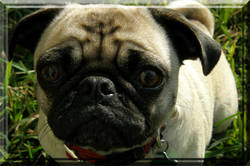 "I know my Pedigree. Wanna see my chart?" "I know my Pedigree. Wanna see my chart?" Have you had fun unearthing all your family's stuff ~ documents, letters, notes, photos, & other memorabilia? Not done yet? Good. The more stuff, the better. Keep working on it. Meanwhile, let's get down on paper the information you have so far. The things you know. Millie, my Pug to the left, brings up a good point. The pedigree chart. When you think about it, building your genealogy or your family history is like building a house. The foundation is where you get the information (sources). The framework of the house represents the facts. And everything else is the family history. The stories. [Simplistic? Yes. But I think it works.] Anywho, the best way to start on the framework is to fill-out a pedigree chart. Are you going to know everything? Um. No. But just as builders have a blueprint of the house they're going to build, you're going to need to start drawing up the blueprint of your family tree. Further, filling out this chart will identify what you know and what you don't know. [You know?] This is important for all your future research. How else do you know what you need to look for? How can you possibly look for answers to questions that you haven't even asked? [*snort* Why is the sky blue? Why is the grass green?] Oh. And to my Ancestry.com user friends, if you already have a pedigree chart from your Ancestry.com tree, great! BUT put it aside. Why? [Because I'm the genealogist. That's why. *wink*] Because it's so easy to merge information into your tree from Ancestry.com. So easy that you might have unknowingly collected information from someone else's family tree that is incorrect and undocumented. [And do I really need to mention what happens when your foundation is not solid? It affects every part of your house. In a bad way.] Now. While Ancestry.com is a very, extremely useful research tool [including the tree], it's just that. A tool. It's not an end product, in my opinion. Don't get me wrong. I use it all the time. But I use it as a tool. [You're just gonna have to trust me on this one. It'll make sense later. I promise.] So, let's take a look at a pedigree chart and how to fill it out. First, free blank pedigree charts can be downloaded from many places online. Here are 2 of them:
Now, I think this chart is pretty self-explanatory. Here are some things, though, to keep in mind when filling it out:
~Caroline 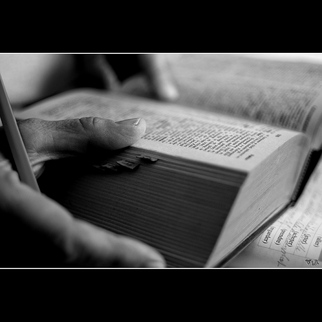 Still gathering all your documents and photos? Great! Fill up that tub/box/laundry basket. Get another one if you have to. While you're doing that, I thought I'd go over something that might seem trivial. Well, it's trivial until someone publicly tells you you're doing it wrong, and hence, you are not very bright. First of all, I'd like to say that some people are just plain rude, even ~ and it pains me to say this ~ if they are right. So what the heck am I talking about? I'm talking about how to spell the word, "genealogy." No, it is not spelled "geneology." It has an "a" not an "o", but that's a good guess. [Promise me you'll never stop guessing. You're gonna need that later.] And I dare anyone to say that from the get-go they knew how to spell it. I mean, why would anyone guess that unlike more common words such as geology, sociology, and psychology, that genealogy is spelled with an "a" and not an "o"? So, why is the "G" word spelled this way? [You didn't really think I'd leave you hanging did you? I mean, why not know more than just the "how", right?] Well according to the Online Etymology Dictionary, the word, "genealogy" comes from the Greek word, "genialogia" which can be broken down further into "genea" which means "generation, descent" and the word "logos" which means "student of". Did you notice the base word, "genea" ends with an "a"? That is why genealogy is spelled with an "a" and not an "o". Simple pimple. Oh, and did you notice the meaning of the second word "logos"? Yes, we are all students ~ learning more and more every day. 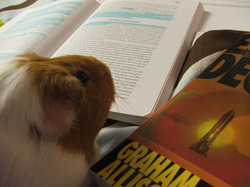 So, would you do me a favor? Now that you know how to spell the "G" word the next time you see it misspelled, would you gently, privately, please tell that person how it is actually spelled, and do it without questioning their intellect? They're just new. They're just a student. Like you. Like me. Studying their familial generations. Their familial descent. You all might even be related. Now wouldn't that be funny? [Snort.] Well, in an awkward kind of way? On second thought, point them towards this post. I'll tell them for ya'. ~Caroline |
Categories
All
Archives
February 2017
|
|
© Copyright For Your Family Story 2016 - All Rights Reserved
|

